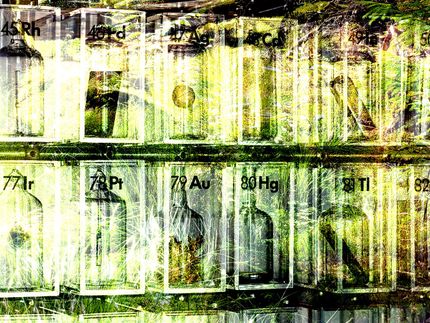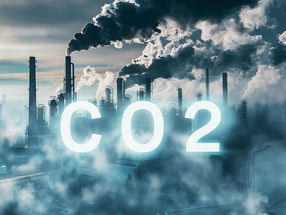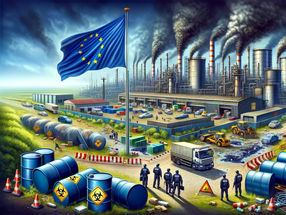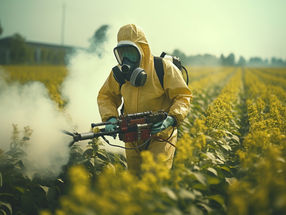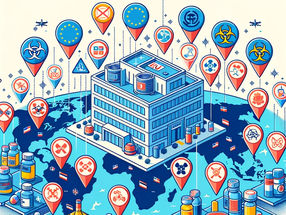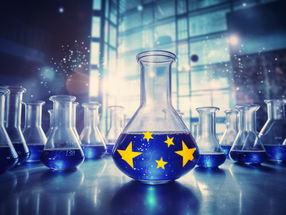Chemists around the globe warn of world food production crisis
Advertisement
Global production of phosphorus fertiliser could peak and decline later this century, causing shortages and price spikes that jeopardise world food production, five major scientific societies warn. Unless action is taken, the crisis will come at a time when the earth’s population surges past nine billion.
Rice, corn, wheat, and other staple food crops require phosphorus which, along with nitrogen and potassium, is one of the three key fertiliser substances that sustain world food supply. World population is projected to grow from 6.1 billion in 2000 to 8.9 billion in 2050, a 47 per cent increase, according to the United Nations.
The report, A Sustainable Global Society, warns not only about ‘peak phosphorus’ - an echo of more familiar concerns about ‘peak oil’ - but raises red flags about the supply of other natural resources where monopolies or political instability could cut off supplies or inflate prices. They include rare earth elements (REEs) and precious metals like lithium, platinum and palladium, needed to produce computers, mobile phones, rechargeable batteries, solar cells, fuel cells, medications, pollution control devices for cars and other key products.
“It is a national security concern for many nations that a small group of countries control the remaining stocks of many precious and vital resources,” the report states. “Politically-motivated national policies restricting export of certain minerals are already being put into practice. Limited availability and high prices of scarce natural resources will quickly start to affect industries across many different sectors.”
The report results from a four-day summit sponsored by the Chinese Chemical Society, the German Chemical Society, the Chemical Society of Japan, the Royal Society of chemistry, and the American Chemical Society. Thirty international experts on materials science participated in the event, part of an ongoing series of summits being held by the societies to seek solutions to some of the world’s most daunting challenges.
“The chemist has a mandate to counsel society on the possible solutions that can be achieved through chemistry,” said Professor Ryoji Noyori, winner of the 2001 Nobel Prize in chemistry, in the report’s forward. “It is to be hoped that our recommendations will be widely disseminated among governments and societies throughout the world as we strive together to achieve the idea, and sustainable, international community.”
Shortages of phosphorus in the soil are especially acute in Australia, the world’s seventh wheat producer, and in sub-Sahara Africa, where phosphorous content limits crop growth and millions of people already face malnutrition and periodic famine. It is likely that resources of phosphate rock, mined to produce fertiliser, will be depleted within the next 30-100 years. At present, no substitute exists for that natural source of phosphorous fertiliser. Two-thirds of the world’s phosphorus resources are in China, Morocco, and the Western Sahara. Demand for phosphorus is already soaring, with the price of diammonium phosphate fertiliser (which also contains nitrogen) doubling in recent years.
A Sustainable Global Society calls for technological breakthroughs to guarantee supplies of phosphorus for future generations. It expresses optimism that chemistry can develop new materials that allow humanity to tap vast new sources of phosphorus, including substances in rivers, oceans, and soil, and also develop technology to extract phosphate from water.
The report also points out that shortages of other elements essential for modern technology, from computers to hybrid cars, will occur unless similar efforts are made to find replacements or improve the efficiency extracting and using existing materials. These materials include lithium, a component of batteries and an ingredient in some pharmaceuticals, as well as platinum, used in fuel cells and as catalysts — substances that improve the efficiency of large-scale chemical manufacturing processes. Other elements in short supply include REEs - a collection of elements that are essential for the production of computers, hybrid-electric cars, military weapons, and other high-tech products.
Professor David Phillips, president of the Royal Society of Chemistry, said: “The focus on global warming sometimes blinds us to the other consequences of increase in the world population and the depletion of other resources needed to sustain and develop the advanced lifestyles we crave. This report warns us of the fact that resources are finite, and are in some instances already in very short supply, but also gives the positive message that chemists can and will provide some of the solutions needed to move to a sustainable world.”
- The report outlines five key areas in which materials chemists, through collaboration with other scientists, industry and policy makers, can seize exciting opportunities to address global challenges. They can:
- help to develop new, sustainable energy conversion and storage technologies that can meet future energy demands, and without increasing harmful emissions of CO2.
- help to reduce CO2 emissions by improving carbon capture and storage (CCS) systems and developing novel ways of activating and using CO2 as a value product for fuels and chemical feedstocks rather than waste.
- help to reduce our dependency on fossil fuels and feedstocks by developing methods to efficiently obtain petroleum from low-quality sources, and processes to efficiently and sustainably utilise fossil fuel alternatives.
- help to reduce, replace and recycle the use of scarce natural resources in many applications, as well as developing alternative new materials based on earth-abundant elements.
- use the principles of green chemistry to meet our energy, material, and water needs in ways that are non-harmful and sustainable. New technologies can be developed to better monitor and remove air, soil, and water pollutants from the environment.
Nancy Jackson, president of the American Chemical Society, added: “Little public awareness exists about the uncertain supplies of these key materials that we face today, and the potential future shortages. Secure, adequate supplies of these materials are essential for production of food, medicines, computers, and hundreds of other products. Coming as it does during the International Year of Chemistry, the report demonstrates how the world’s major scientific societies can collaborate in addressing great global challenges. This is chemistry working for a better life.”
Professor Yasuhiro Iwasawa, President of the Chemical Society of Japan, said: “We are very pleased as a nation to be able to present the second CS3 White Paper during the International Year of Chemistry. Under the theme A Sustainable Global Society top chemists discussed problems facing the world and their solutions, and by publicising the results show the value of chemistry towards building a sustainable society.
“We believe that by pursuing the path of development of alternative energy, green processes, and conversion of scarce resources combined with resolution of food, water, and health issues, a truly sustainable society can be built. The huge earthquake of 11 March followed by the massive tsunami as well as extensive infrastructure damage can be called one of the worst calamities our country has ever experienced and has inflicted great suffering. The Chemical Society of Japan is with support from other countries resolved to apply the knowledge of the chemical community to contribute to rebuilding a strong Japan.”
Professor Markus Antonietti, leader of the German CS3 delegation, said: “This report is one of the most important I was ever allowed to contribute to. Addressing the very big tasks makes active scientists usually very skeptic, but I was impressed by the highest quality, the very constructive working atmosphere and the cohesiveness of values of all the present experts.
“In spite of the very different cultural backgrounds and societal value systems of the nations involved this is very special: it is indeed a global document, dealing with global issues. However, the depletion of scarce resources, remediating the pollution of air, water, and soil, or using the earth’s sustainable energy, all these are obviously topics where national, single-handed efforts are meaningless.
“Contrary to the ‘Club of Rome’, this report not only analyses the admittedly critical situation, it also offers positive proposals how to deal with the situation based on actual or near-by science and technology. One becomes clear by the end of the report: we have a chance to change course and it will be chemistry that will move global society out of the trap.”
Prof. Jiannian Yao, President of the Chinese Chemical Society, said: “Sustainable development is a strong voice of our time. It is also the mission of chemists all over the world. This white paper summarizes the suggestions on solving the global challenges in energy, environment and resources from a group of prominent materials chemists. It does not only provide perspective guidance for chemists, but also points out a roadmap of sustainable developments for the public. This year is the International Year of Chemistry. It is timely and necessary to release this white paper and I am sure it will largely increase the public appreciation of chemical sciences.”



